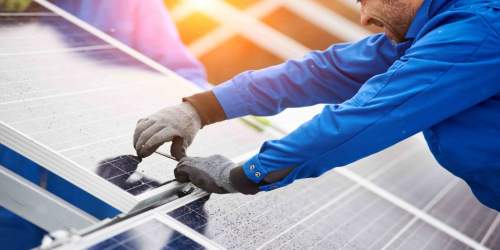Read Time : 4 Minutes
How much Space do I need for Solar Panels
An increasing number of people are investing in solar energy. This is exciting for the world of renewable energy, as it means more people are contributing to green, environmentally friendly energy. It’s beneficial to the planet, but also to our bank accounts, as the energy produced is free and the payback period is relatively well within the lifespan of the system. However, it is also important to know how much solar power you need per square foot (sq ft) or per square meter (m2) before you install.
On this page we will investigate how much space you will need on your roof, how much generation you will get from your panels and what all this means for your pocket.
The Basics
When we talk about solar panels, we usually refer to the power produced in watts (W), kilowatts (kW) or kilowatts per hour (kWh). An example of this in context would be that the average household requires a 4-6kW system in order to produce enough electricity to cover most, it not all of the electrical requirement. A 5-14kW capacity battery is usually required if you want to cover as much of your electrical usage as possible.
Now, a 3kw system will need to be around 226 sq. ft or 21 m2. This may sound quite large, but when we put it into a different measurement, it only comes out at 15ftx15ft or 4.57x4.57m. This will easily fit on most rooftops in the UK.
The output of your solar panel system will depend on the size of the system or kW capacity that you have installed, as well as the panel efficiency, the direction in which the panels face, the pitch of the roof, any shading and finally, if the suns actually shinging! If you want to get the most from your solar panels, they should be facing south and at an angle of 32 degrees with no shade.
COMPARE PRICES FROM LOCAL INSTALLERS
Compare prices from local companies fast & free
Enter your postcode to compare quotes from leading professionals. We promise to keep your information Safe & Secure. Privacy Policy
So, how much electricity per Square Foot or Square Meter?
The amount of electricity (in kilowatts) that you can expect to generate per square foot of solar panels in the UK can vary based on several factors, including the location's solar irradiance, panel efficiency, tilt, shading, and weather conditions. However, I'll provide you with a general estimation based on typical conditions.
Solar Irradiance: The UK receives less sunlight compared to sunnier regions, which affects the solar panel's output. On average, you can expect around 850 to 1,100 kilowatt-hours (kWh) of solar energy per square meter (approximately 10.764 square feet) annually.
Panel Efficiency: Solar panel efficiency determines how well the panel converts sunlight into electricity. The average efficiency of commercially available solar panels is around 15% to 20%.
Given these values, we can calculate the estimated electricity generation per square foot of solar panels in the UK:
Estimated electricity generation (kWh/square foot/year) = (Solar irradiance per square meter) x (Panel efficiency) x (Conversion factor)
Conversion factor: To convert square meters to square feet, we use the conversion factor of 1 square meter ≈ 10.764 square feet.
Let's assume an average solar irradiance of 975 kWh/m²/year and a panel efficiency of 17%:
Estimated electricity generation (kWh/square foot/year) ≈ (975 kWh/m²/year) x (0.17) x (1 m² ≈ 10.764 ft²)
≈ 166.275 kWh/square foot/year
Keep in mind that this is a rough estimation, and actual results may vary depending on the factors mentioned earlier. Additionally, solar panel technology is continually improving, so newer and more efficient panels might yield higher electricity production in the future.
How much does this all cost?
Lets assume that you're buying a 4kW system for £7000. You're paying £1,750 per kW installed.
Keep in mind that this cost is an upfront investment and does not take into account factors like maintenance, installation, and operational costs, which can affect the overall cost of electricity generated by the system over its lifetime.
A 4kW system will never actually output 4kW, in fact the installer will likely install an inverter with capacity to handle around 3.8kW.
Let's assume an average of 5 hours of full sun per day with optimal conditions. In 2022 UK average was 4.9 sunlight hours.
Calculate the daily energy generation: Multiply the system capacity (3.5kW) by the average daily sunlight hours (5 hours) to get the daily energy generation in kilowatt-hours (kWh).
Daily Energy Generation = 3.5 kW × 5 hours = 17.5 kWh
Calculate the annual energy generation: Multiply the daily energy generation (17.5 kWh) by the number of days in a year (365) to get the total annual energy generation in kilowatt-hours (kWh).
Annual Energy Generation = 17.5 kWh/day × 365 days = 6387.5 kWh
So, in optimum conditions, a 3.5kW solar panel system could generate approximately 6387.5 kilowatt-hours of electricity in a year. Please remember that this is an estimation, and actual performance will vary due to weather conditions, system efficiency, and other factors. Given that the average cost per unit of electricity in the UK is £0.34, the potential savings, if you used every kWh produced by your panels yourself and didn't send any back to the grid, is approx. £2171 per year.
Sounds great but don't get too excited. These are the workings for a system in perfect, optimal conditions, for the maximum possible output. We've set this out purely as a guideline to start from.
Realistically, a 4kW system in the UK will provide an average of 3000-3400 kWh/s per year due to all the conditions mentioned above (solar irradiation, orientation, weather, pitch, efficiency, shading etc). This works out at approx. 8 to 9.5 kWh/s Per Day or 0.3 to 0.4 kWh/s Per Hour.
As a standard 4kW solar PV system requires about 28 m2 of roof space, this works out to approx. 121 kWh/s PA per m2 of installed roof area.
On the plus side, the average three bed property in the UK with 2-3 occupants uses approx. 7.94 kWh/s per day, so a 4kW solar panel system is, with a battery, capable of providing all your electricity needs.
Advantages of Solar Energy
- It’s a renewable energy source. This means it will not run out (at least, not for another 5 billion years or so). It is also a clean source of energy, so does not cause pollution after initial manufacture.
- It reduces your electricity bills. The electricity generated by solar panels is technically free as you do not pay for it, reducing the cost of your monthly or annual energy bill. Plus, you can sell the surplus energy back to the grid through the Smart Export Guarantee (SEG).
- It has diverse applications. It can be used to generate electricity, but also for heating. It can be used in areas that don’t have access to the National Grid or for exp, to distill water in regions with limited clean water supplies.
- Maintenance costs are low. The panels don’t require much maintenance aside from a quick wash a couple of times a year. They last around 50 years, and the warranties tend to cover around half of that time.
- Constant development. One of the great things about solar technology is the constant research and development going on to make them more efficient, lighter on your roof and more aesthetically pleasing.
- When installed specifically for purpose, solar panel systems with batteries can operate in a power cut.
- They can potentially remove your relience on energy companies, or at least protect you from the year-on-year cost increase of electricity.
Are There Risks?
Solar panels actually tend to be quite low risk because they don’t have any moving parts, aside from a small inverter. This tends to be the part that may need replacing at some point. Plus, they have great lifespans and warranties.
One of the important things to remember is that you should always use an MCS accredited installer, as not doing so could risk poor installation and also void your warranty. MCS accredited installers know what they are doing and will ensure it is installed to industry standards, as well as providing you with a guarantee. Without MCS installation, you will also not be eligible for the Smart Export Guarantee, should you want it any point.
It is also worth contacting your insurance provider and checking if they require the install to be MCS ceritfied.
As a general rule, you should get at least three quotes before you make a decision on which company you wish to go with.
Want to Know More?
Have you found yourself interested in solar panels? If you want to know more then click the links on the left or visit our online directory of REH approved installation companies. Alternatively, simply give us a ring using the number at the top of this page and have a chat.
Find a local installer
Welcome to the biggest directory of UK renewable energy companies





 How Much do Solar Panel Systems Cost in 2024?
How Much do Solar Panel Systems Cost in 2024?







